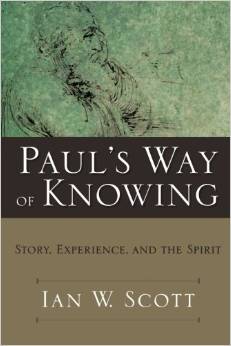Ian Scott: Paul’s Way of Knowing
 Ian W. Scott, Paul’s Way of Knowing: Story, Experience, and the Spirit (Grand Rapids: Baker Academic, 2009), 368 pages, ISBN 9780801036095.
Ian W. Scott, Paul’s Way of Knowing: Story, Experience, and the Spirit (Grand Rapids: Baker Academic, 2009), 368 pages, ISBN 9780801036095.
There have been a number of studies published recently on Paul’s epistemology – several of them trying to show that Paul’s epistemology was somehow “narratival”. The notion of a narrative epistemology is not that easy to grasp and is often confusing, especially since different people mean different things by it.
Ian Scott’s Paul’s Way of Knowing belongs squarely within this turn toward a narrative epistemology. Although there are problems with this position, it must be said that Scott avoids the gravest pitfalls. This is especially because he generally avoids confusing the issue of knowing with the issue of truth (a pitfall that mars a recent book by Andre Munzinger). Once in a while, however, a tendency toward the wilder side of the turn to narrative shows through, as in Scott’s confusion about where “meaning” lies (pp. 116-17), and it certainly doesn’t help Scott’s case that he uses Hans Frei as a support.
I should point out, however, that this book is less about narrative than the title implies. In fact, it was originally published by Mohr Siebeck under the title Implicit Epistemology in the Letters of Paul, which is a better title, as it more accurately relates the contents of the book. I say that because the current subtitle “Story, Experience, and the Spirit” does not describe much of the contents of the book, including, perhaps, its main points. One wonders whether the folks at Baker were just trying to capitalize on the current narrative craze.
A lot of what this book deals with are issues of central importance for the study of Paul, and readers can learn a lot about the present state of Pauline studies from this book. Scott’s judgments are refreshingly level-headed, and at times he makes welcome departure from problematic trends. For example, on pp. 183-85, he bucks the trend by rejecting the reading of pistis Iesous Christou as a subjective genitive.
This is a book for serious students of Paul. Its language is accessible to a wide range of readers, and I certainly recommend it for seminary students, but I fear the importance of its subject matter might escape most lay readers.
Reviewed by John C. Poirier
Preview Paul’s Way of Knowing: books.google.com/books?id=m96VFOxBKlkC
Category: In Depth


